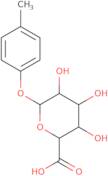p-Cresol glucuronide
CAS: 17680-99-8
Ref. 3D-SAA68099
| 1mg | Discontinued | ||
| 2mg | Discontinued | ||
| 5mg | Discontinued | ||
| 10mg | Discontinued | ||
| 25mg | Discontinued | ||
| 50mg | Discontinued | ||
| 100mg | Discontinued |
Product Information
- 4-Cresol glucuronide
- 4-Methylphenyl β-<span class="text-smallcaps">D</span>-glucopyranosiduronic acid
- 4-methylphenyl beta-D-glucopyranosiduronic acid
- Glucopyranosiduronic acid, p-tolyl, β-<span class="text-smallcaps">D</span>-
- p-Methylphenyl-β-<span class="text-smallcaps">D</span>-glucopyranosiduronic acid
- p-Tolyl-β-D-glucuronic acid
- p-Tolyl-β-D-glucuronide
- p-Tolyl-β-glucuronic acid
- β-<span class="text-smallcaps">D</span>-Glucopyranosiduronic acid, 4-methylphenyl
- β-<span class="text-smallcaps">D</span>-Glucosiduronic acid, p-tolyl
- See more synonyms
- β-D-Glucosiduronic acid, p-tolyl
- β-D-Glucopyranosiduronic acid, 4-methylphenyl
- Glucopyranosiduronic acid, p-tolyl, β-D-
- 4-Methylphenyl β-D-glucopyranosiduronic acid
p-Cresol glucuronide is a metabolite of p-cresol, which is a toxic compound found in the urine and stool of patients with bowel disease. It is produced by the action of target enzymes such as glutathione S-transferases, N-acetyltransferases, and epoxide hydrolase on p-cresol. The conversion of p-cresol to p-cresol glucuronide may be a metabolic response to increased levels of p-cresol in the body. This conversion has been shown to reduce disease activity in patients with kidney disease. In addition, it may also be used for diagnosis purposes as a marker for bowel disease. The matrix effect can affect the detection of this metabolite in urine samples because it relies on protein binding and urinary pH levels. Blood sampling can be used to measure this metabolite instead because blood pH levels are stable and there are no proteins present that could interfere with detection.





